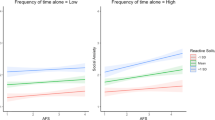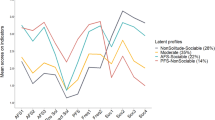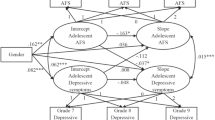Abstract
Research examining the link between solitude and psychosocial adjustment among adolescents has lacked a comprehensive, person-centered examination of differential patterns of both solitude and sociability. The current study surveyed 1071 adolescents (Mage = 12.48, SD = 1.71, 49.86% female, age range = 10–16 years). Using latent-profile analysis, four groups were identified with differential patterns of characteristics of solitude (i.e., enjoyment, motivations, preference, frequency) and sociability. Results indicated that worse psychosocial adjustment across time points was associated with membership in the PFS-NonSociable group (characterized by high enjoyment, preference, and frequency of solitude; low sociability) compared to all other groups. Findings suggest that solitude for adolescents appears to be linked to worse psychosocial adjustment only if accompanied by a lack of sociability.


Similar content being viewed by others
References
Anniko, M. K., Boersma, K., & Tillfors, M. (2019). Sources of stress and worry in the development of stress-related mental health problems: A longitudinal investigation from early- to mid-adolescence. Anxiety, Stress, and Coping, 32(2), 155–167. https://doi.org/10.1080/10615806.2018.1549657
Armsden, G. C., & Greenberg, M. T. (1987). The inventory of parent and peer attachment: Individual differences and their relationship to psychological well-being in adolescence. Journal of Youth and Adolescence, 16(5), 427–454. https://doi.org/10.1007/BF02202939
Asendorpf, J. B. (1990). Beyond social withdrawal: Shyness, unsociability, and peer avoidance. Human Development, 33(4–5), 250–259. https://doi.org/10.1159/000276522
Baumeister, R. F., & Leary, M. R. (1995). The need to belong: Desire for interpersonal attachments as a fundamental human motivation. Psychological Bulletin, 117(3), 497–529. https://www.ncbi.nlm.nih.gov/pubmed/7777651
Blakemore, S.-J., & Mills, K. L. (2014). Is adolescence a sensitive period for sociocultural processing. Annual Review of Psychology, 65, 187–207. https://doi.org/10.1146/annurev-psych-010213-115202
Borg, M. E., & Willoughby, T. (2021). A latent class examination of affinity for aloneness in late adolescence and emerging adulthood. Social Development, 31(3), 587–602. https://doi.org/10.1111/sode.12564
Borg, M. E., & Willoughby, T. (2022a). Affinity for solitude and motivations for spending time alone among early and mid- adolescents. Journal of Youth and Adolescence, 51(1), 156–168. https://doi.org/10.1007/s10964-021-01520-1
Borg, M. E., & Willoughby, T. (2022b). What does it mean to be alone? An analysis of interpretations of solitude among adolescents and adults. Current Psychology, 42, 14498–14505. https://doi.org/10.1007/s12144-022-02796-7
Bosacki, S. (2022). Canadian adolescents’ solitude experiences, self-perceptions, and well-being. Journal of Silence Studies in Education, 2(1), 28–42. https://doi.org/10.31763/jsse.v2i1.30
Bowker, J. C., Nelson, L. J., Markovic, A., & Luster, A. S. (2013). Social withdrawal during adolescence and emerging adulthood. In R. J. Coplan, & J. C. Bowker (Eds.) The handbook of solitude (pp. 167–183). Wiley-Blackwell. https://doi.org/10.1002/9781118427378.ch10
Bruch, M. A., Gorsky, J. M., Collins, T. M., & Berger, P. A. (1989). Shyness and sociability reexamined: A multicomponent analysis. Journal of Personality and Social Psychology, 57(5), 904–915. https://doi.org/10.1037/0022-3514.57.5.904
Burger, J. M. (1995). Individual differences in preference for solitude. Journal of Research in Personality, 29(1), 85–108. https://doi.org/10.1006/jrpe.1995.1005
Campbell, O. L. K., Bann, D., & Patalay, P. (2021). The gender gap in adolescent mental health: A cross-national investigation of 566,829 adolescents across 73 countries. SSM - Population Health, 13, 100742. https://doi.org/10.1016/j.ssmph.2021.100742
Cheek, J. M., & Buss, A. H. (1981). Shyness and sociability. Journal of Personality and Social Psychology, 41(2), 330–339. https://doi.org/10.1037/0022-3514.41.2.330
Chua, S. N., & Koestner, R. (2008). A self-determination theory perspective on the role of autonomy in solitary behavior. The Journal of Social Psychology, 148(5), 645–647. https://doi.org/10.3200/SOCP.148.5.645-648
Coplan, R. J., Hipson, W. E., & Bowker, J. C. (2021). Social withdrawal and aloneliness in adolescence: Examining the implications of too much and not enough solitude. Journal of Youth and Adolescence, 50, 1219–1233. https://doi.org/10.1007/s10964-020-01365-0
Coplan, R. J., Ooi, L. L., & Baldwin, D. (2019). Does it matter when we want to be alone? Exploring developmental timing effects in the implications of unsociability. New Ideas in Psychology, 53, 47–57. https://doi.org/10.1016/j.newideapsych.2018.01.001
Coplan, R. J., Ooi, L. L., Xiao, B., & Rose-Krasnor, L. (2018). Assessment and implications of social withdrawal in early childhood: A first look at social avoidance. Social Development, 27(1), 125–139. https://doi.org/10.1111/sode.12258
Coplan, R. J., Prakash, K., O’Neil, K., & Armer, M. (2004). Do you “want” to play? Distinguishing between conflicted shyness and social disinterest in early childhood. Developmental Psychology, 40(2), 244. https://doi.org/10.1037/0012-1649.40.2.244
Coplan, R. J., & Weeks, M. (2010). Unsociability and the preference for solitude in childhood. In K. H. Rubin & R. J. Coplan (Eds.), The development of shyness and social withdrawal (pp. 64–83). The Guilford Press
Corsano, P., Grazia, V., & Molinari, L. (2019). Solitude and loneliness profiles in early adolescents: A person-centred approach. Journal of Child and Family Studies, 28(12), 3374–3384. https://doi.org/10.1007/s10826-019-01518-1
Daly, O., & Willoughby, T. (2020). A longitudinal person-centered examination of affinity for aloneness among children and adolescents. Child Development, 91, 2001–2018. https://doi.org/10.1111/cdev.13411
Danneel, S., Maes, M., Vanhalst, J., Bijttebier, P., & Goossens, L. (2018). Developmental change in loneliness and attitudes toward aloneness in adolescence. Journal of Youth and Adolescence, 47(1), 148–161. https://doi.org/10.1007/s10964-017-0685-5
Deci, E. L., & Ryan, R. M. (2008). Self-determination theory: A macrotheory of human motivation, development, and health. Canadian Psychology, 49(3), 182–185. https://doi.org/10.1037/a0012801
Erikson, E. H. (1993). Childhood and society. W. W. Norton & Company
Fendrich, M., Weissman, M. M., & Warner, V. (1990). Screening for depressive disorder in children and adolescents: Validating the Center for Epidemiologic Studies Depression Scale for children. American Journal of Epidemiology, 131(3), 538–551. https://doi.org/10.1093/oxfordjournals.aje.a115529.
Goossens, L. (2014). Affinity for aloneness in adolescence and preference for solitude in childhood. In R. J. Coplan, & J. C. Bowker (Eds.), The handbook of solitude (pp. 150–166). Wiley-Blackwell. https://doi.org/10.1002/9781118427378.ch9
Gullone, E., & Robinson, K. (2005). The Inventory of Parent and Peer Attachment-Revised (IPPA-R) for children: A psychometric investigation. Clinical Psychology & Psychotherapy, 12(1), 67–79. https://doi.org/10.1002/cpp.433
Hallquist, M. N., & Wiley, J. F. (2018). An R package for facilitating large-scale latent variable analyses in Mplus. Structural Equation Modeling: A Multidisciplinary Journal, 25, 621–638. https://doi.org/10.1080/10705511.2017.1402334
Hipson, W. E., Coplan, R. J., Dufour, M., Wood, K. R., & Bowker, J. C. (2021). Time alone well spent? A person‐centered analysis of adolescents’ solitary activities. Social Development, 30(4), 1114–1130. https://doi.org/10.1111/sode.12518
Hoppmann, C. A., & Pauly, T. (2022). A lifespan psychological perspective on solitude. International Journal of Behavioral Development, 46(6), 473–480. https://doi.org/10.1177/01650254221130279
Houghton, S., Kyron, M., Hunter, S. C., Lawrence, D., Hattie, J., Carroll, A., & Zadow, C. (2022). Adolescents’ longitudinal trajectories of mental health and loneliness: The impact of COVID-19 school closures. Journal of Adolescence, 94(2), 191–205. https://doi.org/10.1002/jad.12017
James, K. (2001). “I Just Gotta Have My Own Space!”: The bedroom as a leisure site for adolescent girls. Journal Of Leisure Research, 33(1), 71–90. https://doi.org/10.1080/00222216.2001.11949931
Jung, T., & Wickrama, K. A. S. (2008). An introduction to latent class growth analysis and growth mixture modeling. Social and Personality Psychology Compass, 2(1), 302–317. https://doi.org/10.1111/j.1751-9004.2007.00054.x
Kassambara, A. (2023). rstatix: Pipe-friendly framework for basic statistical tests. R package version 0.7.2. https://rpkgs.datanovia.com/rstatix/
Kopala-Sibley, D. C., & Klein, D. N. (2017). Distinguishing types of social withdrawal in children: Internalizing and externalizing outcomes of conflicted shyness versus social disinterest across childhood. Journal of Research in Personality, 67, 27–35. https://doi.org/10.1016/j.jrp.2016.01.003
Kroger, J. (2006). Identity development: Adolescence through adulthood (2nd ed.). SAGE Publications
La Greca, A. M., & Stone, W. L. (1993). Social Anxiety Scale for Children-Revised: Factor structure and concurrent validity. Journal of Clinical Child Psychology, 22(1), 17–27. https://doi.org/10.1207/s15374424jccp2201_2
Larson, R. W., & Csikszentmihalyi, M. (1978). Experiential correlates of time alone in adolescence. Journal of Personality, 46(4), 677–693. https://doi.org/10.1111/j.1467-6494.1978.tb00191.x
Larson, R. W. (1990). The solitary side of life: An examination of the time people spend alone from childhood to old age. Developmental Review, 10(2), 155–183. https://doi.org/10.1016/0273-2297(90)90008-R
Larson, R. W. (1997). The emergence of solitude as a constructive domain of experience in early adolescence. Child Development, 68(1), 80–93. https://doi.org/10.1111/j.1467-8624.1997.tb01927.x
Liu, J., Chen, X., Zhou, Y., Li, D., Fu, R., & Coplan, R. J. (2017). Relations of shyness–sensitivity and unsociability with adjustment in middle childhood and early adolescence in suburban Chinese children. International Journal of Behavioral Development, 41(6), 681–687. https://doi.org/10.1177/0165025416664195
Liu, M., Rubin, K. H., Cen, G.-Z., Gao, X., Li, D., & Chen, X. (2002). Sociability and prosocial orientation as predictors of youth adjustment: A seven-year longitudinal study in a Chinese sample. International Journal of Behavioral Development, 26(2), 128–136. https://doi.org/10.1080/01650250042000690
Maes, M., Wang, J. M., Van den Noortgate, W., & Goossens, L. (2016). Loneliness and attitudes toward being alone in Belgian and Chinese adolescents: Examining measurement invariance. Journal of Child and Family Studies, 25(5), 1408–1415. https://doi.org/10.1007/s10826-015-0336-y
Marcoen, A., Goossens, L., & Caes, P. (1987). Lonelines in pre-through late adolescence: Exploring the contributions of a multidimensional approach. Journal of Youth and Adolescence, 16(6), 561–577. https://doi.org/10.1007/BF02138821
Marini, Z., Spear, S., & Bombay, K. (1999). Peer victimization in middle childhood: Characteristics, causes, and consequences of school bullying. Brock Education Journal, 9(1). https://doi.org/10.26522/brocked.v9i1.329
McVarnock, A., Cheng, T., Polakova, L., & Coplan, R. J. (2023). Are you alone? Measuring solitude in childhood, adolescence, and emerging adulthood. Frontiers in Psychiatry, 14. https://doi.org/10.3389/fpsyt.2023.1179677
Morneau-Vaillancourt, G., Matte-Gagné, C., Cheesman, R., Brendgen, M., Vitaro, F., Tremblay, R., Dionne, G., & Boivin, M. (2021). Social wariness, preference for solitude, and peer difficulties in middle childhood: A longitudinal family-informed study. Developmental Psychology, 57(3), 410–420. https://doi.org/10.1037/dev0000961
Nguyen, T.-V. T., Ryan, R. M., & Deci, E. L. (2018). Solitude as an approach to affective self-regulation. Personality & Social Psychology Bulletin, 44(1), 92–106. https://doi.org/10.1177/0146167217733073
Nicol, C. C. (2005). Self-determined motivation for solitude and relationship: Scale development and validation (Doctoral dissertation). Retrieved from dissertation abstracts international (Accession No. 2006-99010-059)
Nylund, K. L., Asparouhov, T., & Muthén, B. O. (2007). Deciding on the number of classes in latent class analysis and growth mixture modeling: A Monte Carlo simulation study. Structural Equation Modeling: A Multidisciplinary Journal, 14(4), 535–569. https://doi.org/10.1080/10705510701575396
Ooi, L. L., Baldwin, D., Coplan, R. J., & Rose-Krasnor, L. (2018). Young children’s preference for solitary play: Implications for socio-emotional and school adjustment. The British Journal of Developmental Psychology, 36(3), 501–507. https://doi.org/10.1111/bjdp.12236
R Core Team. (2022). R: A language and environment for statistical computing. R Foundation for Statistical Computing, Vienna, Austria. https://www.R-project.org/
Reijntjes, A., Dekovic, M., & Telch, M. J. (2007). Support for the predictive validity of the SASC-R: Linkages with reactions to an in vivo peer evaluation manipulation. Journal of Anxiety Disorders, 21(7), 903–917. https://doi.org/10.1016/j.janxdis.2006.10.007
Ren, D., Wesselmann, E., & Williams, K. D. (2016). Evidence for another response to ostracism: Solitude seeking. Social Psychological and Personality Science, 7(3), 204–212. https://doi.org/10.1177/1948550615616169
Ren, L., Han, X., Li, D., Hu, F., Mo, B., & Liu, J. (2020). The association between loneliness and depression among Chinese college students: Affinity for aloneness and gender as moderators. The European Journal of Developmental Psychology, 1–14. https://doi.org/10.1080/17405629.2020.1789861
Riazi, N. A., Battista, K., Duncan, M. J., Wade, T. J., Pickett, W., Ferro, M. A., Leatherdale, S. T., & Patte, K. A. (2023). Stronger together: Coping behaviours and mental health changes of Canadian adolescents in early phases of the COVID-19 pandemic. BMC Public Health, 23(1), 319. https://doi.org/10.1186/s12889-023-15249-y
Rubin, K. H., & Asendorpf, J. B. (2014). Social withdrawal, inhibition, and shyness in Childhood: Conceptual and Definitional Issues. In K. H. Rubin, & J. B. Asendorpf (Eds.), Social withdrawal, inhibition, and shyness in childhood (pp. 3–19). Psychology Press
Schafer, J. L., & Graham, J. W. (2002). Missing data: Our view of the state of the art. Psychological Methods, 7(2), 147–177. https://www.ncbi.nlm.nih.gov/pubmed/12090408
Sette, S., Zava, F., Baumgartner, E., Baiocco, R., & Coplan, R. J. (2017). Shyness, unsociability, and socio-emotional functioning at preschool: The protective role of peer acceptance. Journal of Child and Family Studies, 26(4), 1196–1205. https://doi.org/10.1007/s10826-016-0638-8
Smith, T. E. (1997). Adolescent gender differences in time alone and time devoted to conversation. Adolescence, 32(126), 483–496. https://www.ncbi.nlm.nih.gov/pubmed/9179344
Spangler, T., & Gazelle, H. (2009). Anxious solitude, unsociability, and peer exclusion in middle childhood: A multitrait-multimethod matrix. Social Development, 18(4), 833–856. https://doi.org/10.1111/j.1467-9507.2008.00517.x
Teppers, E., Luyckx, K., Vanhalst, J., Klimstra, T., & Goossens, L. (2014). Attitudes towards aloneness duringadolescence: a person-centred approach. Infant and Child Development, 23(3), 239–248
Thomas, V. (2023). The psychological affordances of solitude in emerging adulthood. Emerging Adulthood, 11(3), 611–625. https://doi.org/10.1177/21676968231151982
Thomas, V., & Azmitia, M. (2019). Motivation matters: Development and validation of the Motivation for Solitude Scale-Short Form (MSS-SF). Journal of Adolescence, 70, 33–42. https://doi.org/10.1016/j.adolescence.2018.11.004
Wang, J. M., Rubin, K. H., Laursen, B., Booth-LaForce, C., & Rose-Krasnor, L. (2013). Preference-for-solitude and adjustment difficulties in early and late adolescence. Journal of Clinical Child and Adolescent Psychology, 42(6), 834–842. https://doi.org/10.1080/15374416.2013.794700
Weissman, M. M., Orvaschel, H., & Padian, N. (1980). Children’s symptom and social functioning: Self-report scales. Journal of Nervous and Mental Disorders, 168, 736–740. http://www.highriskdepression.org/files/1980D.pdf
Wesselmann, E. D., Williams, K. D., Ren, D., & Hales, A. H. (2021). Ostracism and solitude. In R. J. Coplan, & J. C. Bowker (Eds.), The handbook of solitude (pp. 209–223). Wiley-Blackwell. https://doi.org/10.1002/9781119576457.ch15
Willoughby, T., Heffer, T., van Noordt, S., Desjardins, J., Segalowitz, S., & Schmidt, L. (2021). An ERP investigation of children and adolescents’ sensitivity to wins and losses during a peer observation manipulation. Developmental Cognitive Neuroscience, 51, 100995. https://doi.org/10.1016/j.dcn.2021.100995
Winnicott, D. W. (1958). The Capacity to Be Alone. In D.W. Winnicott (Ed.), The Maturational Processes and the Facilitating Environment (pp. 29–36). London: Karnac Books
Wood, K. R., Coplan, R. J., Hipson, W. E., & Bowker, J. C. (2022). Normative beliefs about social withdrawal in adolescence. Journal of Research on Adolescence, 32(1), 372–381. https://doi.org/10.1111/jora.12617
Xiao, B., Bullock, A., Liu, J., & Coplan, R. (2021). Unsociability, peer rejection, and loneliness in Chinese early adolescents: Testing a cross-lagged model. The Journal of Early Adolescence, 41(6), 865–885. https://doi.org/10.1177/0272431620961457
Zhang, L., & Eggum-Wilkens, N. D. (2018). Unsociability in Chinese adolescents: Cross-informant agreement and relations with social and school adjustment. Social Development, 27(3), 555–570. https://doi.org/10.1111/sode.12284
Zheng, K., Coplan, R. J., Chen, X., & Bian, Y. (2022). Longitudinal associations between depressive symptoms and preference for solitude among Chinese early adolescents: Separating between-person from within-person effects. The Journal of Early Adolescence, 43(6). https://doi.org/10.1177/02724316221124794
Zhou, T., Liao, L., Nguyen, T.-V. T., Li, D., & Liu, J. (2023). Solitude profiles and psychological adjustment in Chinese late adolescence: A person-centered research. Frontiers in Psychiatry, 14, 1173441. https://doi.org/10.3389/fpsyt.2023.1173441
Funding
This study was supported by a grant from the Canadian Institutes of Health Research to T.W.
Data Sharing and DeclarationThis manuscript’s data will not be deposited.
Author information
Authors and Affiliations
Contributions
M.E.B. took the lead role in the interpretation and drafting of the manuscript. M.E.B. and T.W. conceived of the study, participated in performing the statistical analyses, and drafted the manuscript. M.E.B. and T.W. read and approved the final manuscript.
Corresponding author
Ethics declarations
Conflict of interest
The authors declare no competing interests.
Ethical approval
This study has ethics approval from Brock University (REB 16-080).
Informed Consent
All participants’ parents provided written consent and participants provided written assent.
Additional information
Publisher’s note Springer Nature remains neutral with regard to jurisdictional claims in published maps and institutional affiliations.
Supplementary Information
Rights and permissions
Springer Nature or its licensor (e.g. a society or other partner) holds exclusive rights to this article under a publishing agreement with the author(s) or other rightsholder(s); author self-archiving of the accepted manuscript version of this article is solely governed by the terms of such publishing agreement and applicable law.
About this article
Cite this article
Borg, M.E., Willoughby, T. When is Solitude Maladaptive for Adolescents? A Comprehensive Study of Sociability and Characteristics of Solitude. J. Youth Adolescence 52, 2647–2660 (2023). https://doi.org/10.1007/s10964-023-01856-w
Received:
Accepted:
Published:
Issue Date:
DOI: https://doi.org/10.1007/s10964-023-01856-w




